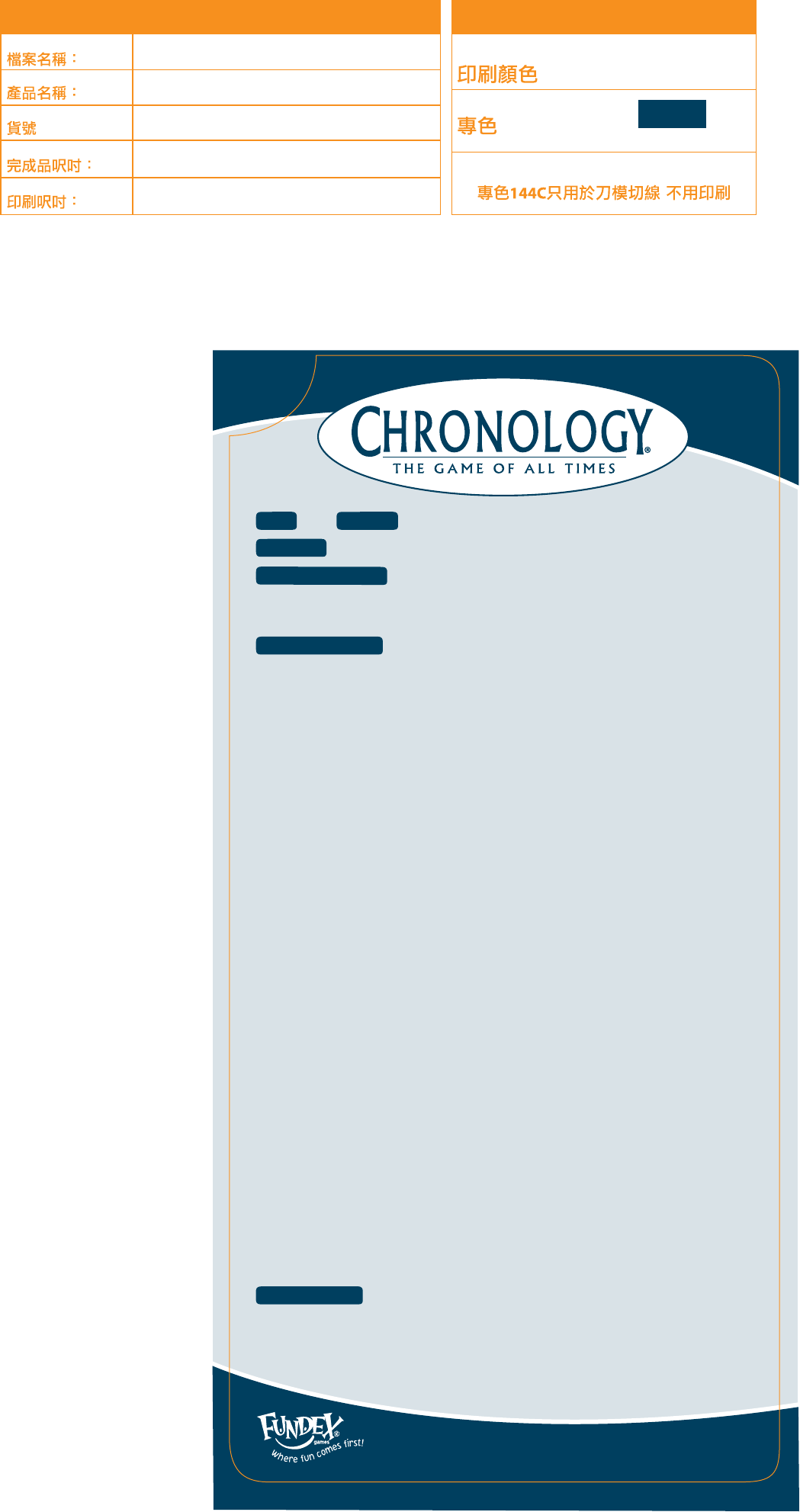
Item No. 0795-00-12
©2008 Fundex Games, Ltd. • P.O. Box 421309 • Indianapolis, IN 46242
1.800.486.9787 • email customerservice@fundexgames.com
www.fundexgames.com MADE IN CHINA
AGES: 8+ PLAYERS: 2+
CONTENTS: The game consists of 200 event cards and 6 game trays.
OBJECT OF THE GAME: To collect a total of ve event cards by correctly guessing where each
card should be placed in chronological order in each player’s timeline. Choose to play with all
categories or one category only.
RULES OF THE GAME: Shue the cards and place them year side down in the middle of the
table. Each player draws a card, reads it out loud and then places it in any slot in their card tray.
This card represents the rst card in the player’s timeline.
One player begins by drawing a card from the stack and reading the information out loud to all
the players without revealing the date. The player to the left then starts by deciding whether
the event occurred before or after the card in their card tray. If the player guesses correctly, then
the player wins the card and places it in the card tray in the proper order in their timeline. Each
card in the player’s timeline breaks up that timeline into segments. On the next turn, the player
will have to determine whether the card should be placed before, after or in between the cards
in their timeline. Each player works only with their own timeline, but each player may look at
the timeline of the other players and learn from the information contained in their cards.
Example: There are four cards in a player’s timeline: 1492, 1787,1903, and 1984. The
choices the player has are: before 1492, between 1492 and 1787, between 1787 and
1903, between 1903 and 1984, or after 1984. The player must announce the dates out loud
as they guess because, if they miss, the other players have an opportunity to win the card after
listening to the mistake of their opponent. If the year on the card is in the position guessed by
the player, (example: The card is 1984 and the player guesses between 1903 to 1985),
then the player wins the card. Note: In case of a player holding more than one card for a given
year, the card in play can correctly be placed before or after the duplicate year card.
If the player guesses incorrectly, the next player to the left may win the card by correctly
guessing where it ts in their own timeline. If that player misses, then the play proceeds
around the table to the left, allowing the next player to guess. If no one guesses correctly, then
the player reading the card will announce the date on the card, then put it back in the box.
The next player to the left then reads the next card to the player to their left. That person will
now guess rst where the card should be placed in their timeline. The game continues in this
manner until one person accumulates ve cards in their timeline. That player is the winner and
the game is over. The cards may be reshued and play may begin again. Although the same
cards may come up in play in other games to follow, each game will create a dierent timeline
for the players.
THE “c.” SYMBOL: The “c.” appearing before some of the dates means “around” or “about.”
Some dates are very dicult to pinpoint. Or perhaps historians disagree as to exactly when
the event occurred. Please be aware that as our ability to understand and evaluate history
improves, the dates of certain important events may change. We have used the most
accurate and current information available to us as of the date of publication.
FUNDEX GAMES, LTD. COLOR
CMYK
SPOT COLORS
DO NOT PRINT PANTONE 144C! (DIELINE)
FILE NAME:
3827-00-I_Sketchy.EPS
Sketchy
Pantone 303C
3827-00-31
5”W x 10.25”H
5”W x 10.25”H
PRODUCT:
ITEM NUMBER:
ASSEMBLED SIZE:
FLAT SIZE:



